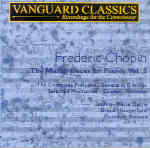One of this collection’s two discs replicates Jeanne-Marie Darré’s 1965 Vanguard release containing the Chopin Preludes Op. 28, Berceuse, and F minor Fantasy. The pianist’s craftsmanship stands out for cleanness and honesty, as her fingers do most of the hard work while her feet touch the pedals only on an if-and-when-needed basis. Textually speaking, Darré’s old-school background manifests itself both through modifying Chopin’s dynamic markings and by filling out octaves with fifths at certain climactic points. Certain minor-key Preludes (G-sharp, E-flat, B-flat, F, G, and D) lack their requisite bigness and galvanic urgency. Others, like the D major, F-sharp minor, E-flat major, and F major, stand out for the pianist’s crystalline clarity and cogent voice leading. She deliberates over the A minor Prelude and makes sure that the perpetually disturbing left-hand dissonances don’t go by unnoticed.
The F minor Fantasy inspires even more daring, dynamically charged playing from Darré–all to the music’s good. But her Berceuse sounds rather matter-of-fact and ordinary next to the lapidarian wizardry of a Kempff, Gieseking, Solomon, Perahia, or Guiomar Novaes. I wish the latter’s Vanguard recording of the piece had been included instead. Still, we get other choice items from her sole Chopin outing for the label. The Third and Fourth Ballade patiently unfold with imaginatively shaded nuances and a complete avoidance of pyrotechincal display. Those expecting power and propulsion probably will not warm to these performances, yet it takes a real virtuoso (as well as sensitive musician) to make the Fourth Ballade coda’s taxing counterpoint truly speak as it does here. On the other hand, Novaes’ fingers both speak and scintillate in the two G-flat Etudes. Like Vladimir Horowitz, she’s one of few pianists to take the “Black Key” etude’s final descending double octaves in tempo, without slowing them down.
The prize of this reissue, though, is Bruce Hungerford’s remarkable account of the B minor Sonata. Those familiar with his lean, taut, and thoroughly modern Beethoven interpretations may be surprised, even shocked at Hungerford’s liberal tempo fluctuation, outsized rubato, and penchant for highlighting inner voices both real and contrived. You wonder if the ghost of Ignaz Friedman, with whom Hungerford studied in his native Australia, permeated the recording studio. I hasten to add that Hungerford’s digressions penetrate the music’s elaborate infrastructure and rich harmonic content with tremendous conviction and technical aplomb. Similar large-scale ideas come to ravishing fruition in the pianist’s account of the C-sharp minor Mazurka. By contrast, his D-flat Nocturne is relatively subdued, meditative, and wonderfully limpid.
The earliest recordings (Darré) boast the cleanest, fullest sonics, while the most recent items (Hungerford) sound relatively murky. Two complaints: Why did the producers allot a single track for the entire B minor sonata rather than the expected one track per movement? And if you can decipher this package’s graphics with ease, let me know what brand of carrots you eat!
































